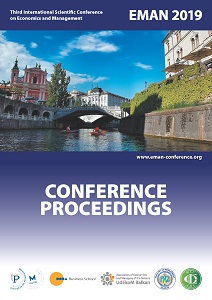SPREMNOST NA PLAĆANJE CJENOVNE PREMIJE ZA EKOLOŠKE PREHRAMBENE PROIZVODE
WILLINGNESS TO PAY THE PREMIUM PRICE FOR ECO-FOOD PRODUCTS
Author(s): Marija Ham
Subject(s): Agriculture, Socio-Economic Research
Published by: Udruženje ekonomista i menadžera Balkana
Keywords: price premium; ecological food products; willingness to pay; attitudes; trust; perceived knowledge;
Summary/Abstract: A price premium, i.e. a higher price compared to conventional products, is present today in most ecological products. It can be the result of the price strategy, that is, the strategy of brand differentiation, but also the actual higher cost of production. Therefore, it is of great importance to marketers of organic products, and therefore to researchers in the subject area, to understand the factors that influence the willingness to pay a price premium for organic products. In some studies, the intention to buy ecological products is equated, that is, it is measured precisely by means of the variable willingness to pay a price premium. In Croatia, the purchase of ecological food products is the most developed and most accepted when it comes to the purchase of ecological products, and it is also the most accepted form of ecologically oriented behavior. The purchase of organic food products therefore represents an appropriate context for this kind of research, and in order to contribute to the development of knowledge and the creation of a knowledge base that can further be applied to other categories of products and other forms of environmentally oriented behavior. price premium. The research was conducted on a sample of 411 respondents from eastern Croatia, who represent people who buy most of the food for the household. The results of the regression analysis showed that attitudes towards the environment have the strongest positive influence on willingness to pay a price premium, and trust in ecological products and labels is an almost equally strong predictor. Consumers who are concerned about the state of the environment and see their role in it as important, will be ready to pay more for products that contribute positively to that issue, which is important to them, and trust in the credibility of ecological products and labels is expected to be of great importance. Furthermore, consumers who believe that contributing to the local economy is an extremely important issue, will be ready to buy those local and domestic products despite the higher price. A slightly weaker, but also statistically significant influence on the willingness to pay the premium price was also determined for the construct perceived knowledge about environmental issues and attitudes about health. The implications of these results point to the conclusion that it is particularly important for marketers of organic food products to educate consumers, which will enable them to understand the effects of organic food products both on the environment and on the local economy, as well as on their health. It is particularly important to pay attention to the credibility, verifiability and transparency of claims in order to build trust, but also to mark consumers and raise the level of perceived knowledge. Consumers who have a high level of trust and self-confidence regarding their own knowledge will be more inclined to transfer their attitudes and knowledge to members of their reference groups. In a theoretical sense, this work contributes to knowledge about the influencing factors on the variable: willingness to pay a price premium for ecological products, which was identified in earlier research as one of the key determinants of ecologically oriented behavior.
Book: EMAN 2019 / 3 – Economics & Management: How to Cope with Disrupted Times - CONFERENCE PROCEEDINGS
- Page Range: 431-440
- Page Count: 10
- Publication Year: 2019
- Language: Croatian
- Content File-PDF

